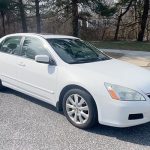The 2011 Honda Accord is a popular mid-size sedan that has been well-regarded for its reliability and performance. However, like any vehicle, it is not immune to problems.
Some common issues that have been reported by owners of the 2011 Honda Accord include transmission issues, engine problems, and electrical malfunctions.
It is essential for owners of this model to be aware of these potential issues and to address them promptly to ensure the safety and reliability of their vehicles.
In this article, we will discuss some of the most common problems that have been reported with the 2011 Honda Accord, as well as potential solutions.

2011 Honda Accord Problems
1. Check Engine and D4 Lights Flashing
The check engine light is a warning indicator that illuminates when the vehicle’s onboard diagnostic system detects a problem with the engine or another method. The D4 light, also known as the transmission indicator, is a warning light that indicates a problem with the transmission.
If both of these lights are flashing, it could indicate a serious issue with the vehicle and should be addressed as soon as possible.
2. Radio/Climate Control Display May Go Dark
Some owners of the 2011 Honda Accord have reported that the display for the radio and climate control system may go dark and become unresponsive. This can be frustrating for drivers, as it can make it difficult to adjust the radio or change the temperature in the vehicle.
3. Faulty Door Lock Actuator May Cause Power Door Locks to Activate Intermittently
The door lock actuator is a component that controls the power of door locks. If it is faulty, it can cause the door locks to activate intermittently, which can be frustrating and potentially dangerous.
4. Warped Front Brake Rotors May Cause Vibration When Braking
The brake rotors are a crucial component of the braking system, and if they become warped, they can cause a vibration when braking. This can be dangerous and should be addressed as soon as possible.
5. Air Conditioning Blowing Warm Air
If the air conditioning system in a 2011 Honda Accord is blowing warm air, it could indicate a problem with the system. This could be caused by a variety of issues, such as a faulty compressor, a leak in the system, or a problem with the refrigerant.
It is important to diagnose and fix this issue as soon as possible, as driving in a hot vehicle can be uncomfortable and potentially dangerous.
6. Front Compliance Bushings May Crack
The compliance bushings are rubber components that connect the suspension to the vehicle frame. They are designed to absorb shock and help smooth out the ride. If these bushings crack, it can cause handling problems and a rough ride.
7. Driver’s Door Latch Assembly May Break Internally
The door latch assembly is a crucial component that allows the door to be opened and closed. If it breaks internally, it can cause the door to become stuck and make it difficult to open or close. This can be a safety issue, as it can make it difficult to exit the vehicle in an emergency.
8. Bad Engine Mounts May Cause Vibration, Roughness, and Rattle
The engine mounts are components that hold the engine in place and isolate it from the rest of the vehicle. If they are faulty, it can cause the engine to vibrate, which can be felt throughout the vehicle and cause a rough or rattle-like noise.
This can be frustrating for drivers and may also indicate a more serious issue with the engine or the vehicle’s suspension.
9. Bad rear hub/bearing unit
The hub and bearing unit is a component located in the wheel assembly that allows the wheels to rotate smoothly. If it becomes faulty, it can cause problems such as a loud noise, vibration, or difficulty steering.
It is essential to diagnose and fix this issue promptly to ensure the safety and reliability of the vehicle.
10. Water Leak Due to Plugged AC Drain
The AC drain is a small tube that allows water to drain from the air conditioning system. If it becomes plugged, it can cause water to leak inside the vehicle. This can be a nuisance and may also cause damage to the interior of the vehicle.
11. Failed VTEC oil pressure switch
The VTEC (Variable Valve Timing and Lift Electronic Control) system is a technology used in Honda engines to improve fuel efficiency and performance. The VTEC oil pressure switch is a component that controls the operation of the VTEC system.
If it fails, it can cause the check engine light to come on and may affect the performance of the engine.
12. Check Engine Light Due to Low Engine Oil Level
The check engine light is a warning indicator that illuminates when the vehicle’s onboard diagnostic system detects a problem. One common cause of the check engine light coming on is a low engine oil level.
It is important to regularly check the oil level in a vehicle to ensure that it is at the proper level, as low oil levels can cause serious damage to the engine.
13. Check Engine Light and Engine Takes too Long to Start
If the check engine light is illuminated and the engine is taking too long to start, it could indicate a problem with the ignition or fuel system.
It is important to diagnose and fix this issue promptly, as starting problems can be frustrating and may also indicate a more serious issue with the vehicle.
14. Engine Leaking Oil
If the engine is leaking oil, it can cause a variety of problems, including reduced performance, increased fuel consumption, and damage to the engine. It is important to diagnose and fix this issue promptly to prevent further damage to the vehicle.
15. Honda Fuel Pump Relay Recall
Some 2011 Honda Accords were recalled due to a problem with the fuel pump relay, which could cause the fuel pump to fail. If the fuel pump fails, the engine may not start or may stall while driving, which can be dangerous.
If your vehicle is affected by this recall, it is important to have the issue addressed by a Honda dealer as soon as possible.
Possible Solution
| Problem | Possible Solution |
| Check Engine and D4 Lights Flashing | Have the vehicle’s diagnostic system checked by a mechanic to determine the cause of the issue and make necessary repairs |
| Radio/Climate Control Display May Go Dark | Have the display checked and repaired by a mechanic |
| Faulty Door Lock Actuator | Replace the faulty door lock actuator |
| Warped Front Brake Rotors | Replace the brake rotors |
| Air Conditioning Blowing Warm Air | Have the air conditioning system checked and repaired by a mechanic |
| Front Compliance Bushings May Crack | Replace the faulty compliance bushings |
| Driver’s Door Latch Assembly May Break Internally | Replace the faulty door latch assembly |
| Bad Engine Mounts | Replace the faulty engine mounts |
| Bad rear hub/bearing unit | Replace the faulty hub/bearing unit |
| Water Leak Due to Plugged AC Drain | Have the AC drain cleaned or replaced by a mechanic |
| Failed VTEC oil pressure switch | Replace the faulty VTEC oil pressure switch |
| Check Engine Light Due to Low Engine Oil Level | Check the engine oil level and add oil as needed |
| Check Engine Light and Engine Takes too Long to Start | Have the ignition and fuel systems checked and repaired by a mechanic |
| Engine Leaking Oil | Have the engine checked and repaired by a mechanic |
| Honda Fuel Pump Relay Recall | Have the fuel pump relay replaced by a Honda dealer |
2011 Honda Accord Recalls
| Recall | Description | Date | Models Affected |
| Recall 19V502000 | Newly Replaced Passenger Air Bag Inflator Ruptures During Deployment Spraying Metal Fragments | Jul 1, 2019 | 10 models affected |
| Recall 19V378000 | Replacement Passenger Frontal Air Bag Inflator Improperly Installed During Previous Recall | May 17, 2019 | 10 models affected |
| Recall 18V661000 | Passenger Air Bag Inflator Ruptures During Deployment Spraying Metal Fragments | Sep 28, 2018 | 9 models affected |
| Recall 18V268000 | Front Passenger Air Bag Inflator Potentially Installed Improperly During Replacement | May 1, 2018 | 10 models affected |
| Recall 18V042000 | Passenger Air Bag Inflator Ruptures During Deployment Spraying Metal Fragments | Jan 16, 2018 | 9 models affected |
| Recall 17V545000 | Replacement Air Bag Inflator For Previous Recall May Have Been Improperly Installed | Sep 6, 2017 | 8 models affected |
| Recall 17V030000 | Passenger Air Bag Inflator Ruptures During Deployment Spraying Metal Fragments | Jan 13, 2017 | 9 models affected |
| Recall 16V346000 | Passenger Frontal Air Bag Inflator Ruptures On Deployment | May 24, 2016 | 9 models affected |
| Recall 10V640000 | Front Suspension Bolts Not Secure | Dec 22, 2010 | 2 models affected |
Recall 19V502000:
This recall was issued due to a problem with the passenger air bag inflator, which could rupture during deployment, spraying metal fragments. This could result in serious injury or death to the vehicle’s occupants.
Recall 19V378000:
This recall was issued due to a problem with the replacement passenger frontal airbag inflator, which may have been improperly installed during a previous recall. This could cause the airbag to deploy improperly in the event of a crash, increasing the risk of injury.
Recall 18V661000:
This recall was issued due to a problem with the passenger air bag inflator, which could rupture during deployment, spraying metal fragments. This could result in serious injury or death to the vehicle’s occupants.
Recall 18V268000:
This recall was issued due to a problem with the front passenger airbag inflator, which may have been installed improperly during replacement. This could cause the airbag to deploy improperly in the event of a crash, increasing the risk of injury.
Recall 18V042000:
This recall was issued due to a problem with the passenger air bag inflator, which could rupture during deployment, spraying metal fragments. This could result in serious injury or death to the vehicle’s occupants.
Recall 17V545000:
This recall was issued due to a problem with the replacement air bag inflator for a previous re call, which may have been improperly installed. This could cause the passenger frontal air bag to deploy improperly in the event of a crash, increasing the risk of injury.
Recall 17V030000:
This recall was issued due to a problem with the passenger air bag inflator, which could rupture during deployment, spraying metal fragments. This could result in serious injury or death to the vehicle’s occupants.
Recall 16V346000:
This recall was issued due to a problem with the passenger frontal air bag inflator, which could rupture on deployment. This could result in serious injury or death to the vehicle’s occupants.
Recall 10V640000:
This recall was issued due to a problem with the front suspension bolts, which may not be secure. This could cause a loss of steering, increasing the risk of a crash.
Problems and Complaints Sources
https://repairpal.com/2011-honda-accord/problems
All Honda Accord years we talked about –




